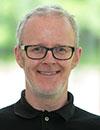Dr Donncha Dunican (BSc, PhD, PgCAP, FHEA)
Senior Scientist (Bioinformatician)

- Queens Medical Research Institute
- Institute for Regeneration and Repair
- Centre for Cardiovascular Sciences
Contact details
- Tel: +44 (0) 131 242 6779
- Email: donncha.dunican@ed.ac.uk
Address
- Street
-
Queens Medical Research Institute
University of Edinburgh
47 Little France Crescent
Crewe Road - City
- Edinburgh
- Post code
- EH16 4TJ
- Street
-
Institute for Regeneration and Repair
Edinburgh BioQuarter
4-5 Little France Drive - City
- Edinburgh
- Post code
- EH16 4UU
Background
I studied Biochemistry at NUI Galway before completing a PhD in Cancer Transcriptomics at Trinity College Dublin, where I investigated alterations in epigenetic regulators between familial and sporadic colon cancers. In 2001, I moved to Edinburgh University as a Wellcome Trust postdoctoral Fellow (using Xenopus laevis as a model system of embryonic epigenetic regulation) and was later awarded a Career Development Fellowship with the MRC, where I shifted focus to mammalian models of epigenetic regulation. I was promoted to Investigator Scientist in 2008, leading research into the mechanisms of de novo and maintenance DNA methylation, epigenetic reprogramming and cell identity.
During this time, I published key high-impact findings, supervised PhD students and developed my expertise in next-generation sequencing and bioinformatics. Between 2021 and 2024, I also completed the Postgraduate Certificate in Academic Practice (PGCAP), contributing to undergraduate and postgraduate teaching developing my pedagogical practice.
In 2023, I joined Fios Genomics for one year as a Senior Bioinformatician, applying large-scale data analysis to pharmaceutical and biotech projects. In 2025, I returned to academia as Senior Scientist (Bioinformatician) with the BHF Research Excellence Award 4 at the University of Edinburgh.
Qualifications
B.Sc. in Biochemistry (1st Class) (University College Galway)
Ph.D. in Colorectal Cancer Transcription (Trinity College Dublin)
Postgraduate Certificate in Academic Practice (PgCAP) (University of Edinburgh)
Responsibilities & affiliations
Fellow of the Higher Education Academy
Research summary
My research focuses on understanding how epigenetic mechanisms, including DNA methylation and chromatin states, establish and maintain cell identity in early development and in cancer. I am particularly interested in how a single genome can give rise to millions of distinct epigenomes and how disruptions in these programs contribute to disease. My work has combined experimental and computational approaches to integrate diverse NGS modalities, applying dimension reduction and other analytical methods to reveal key regulatory principles. Studies such as my work on bivalency ratio (BMC Biology, 2020), Lsh mediated chromatin regulation (Genome Biology, 2013) and senescence-associated epigenetic changes (Nat Cell Biol, 2013) illustrate these interests. More recently, I have explored epigenetic fidelity in the colon (Nature, 2025), linking transcription factor chromatin access to lineage plasticity.
Current research interests
My current research interests lie at the intersection of epigenetic regulation, cell identity and cardiovascular biology. I am particularly interested in how chromatin states and DNA methylation shape cell fate and tissue function and how these programs are altered in heart disease. Building on my previous work in development and cancer, I now aim to explore cardiovascular-specific questions: leveraging single-cell and spatial transcriptomics alongside metabolomic and other high-dimensional datasets. I am focused on integrating these diverse modalities using computational approaches, including dimension reduction and multi-omics data fusion, to uncover the regulatory logic underlying cell states in the heart and vasculature. By combining mechanistic insights with advanced data analysis, I seek to collaborate with researchers in basic cardiovascular science, driving discoveries that link epigenetic regulation, metabolism and cell identity to health and disease.Knowledge exchange
I have been involved in (and will continue to) teaching PG students, perform public engagement of science duties and volunteer in PG student pastoral support.
